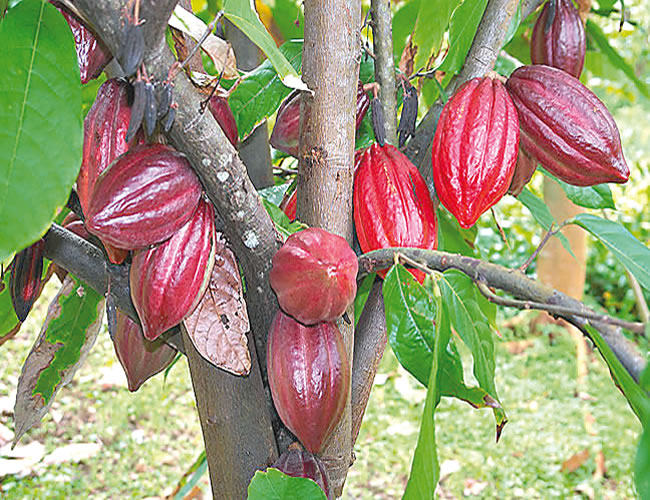•Cocoa farm
Stakeholders have advocated for an elimination of all forms of forced labour and child labour and called for improved working condition of individuals in the cocoa industry in Nigeria.
The stakeholders made the call at a forum held in Ibadan, Oyo State, to examine the report of one-year investigation by African Law Foundation (AFRILAW) into the cocoa industry in Nigeria, with five major cocoa-producing states of Ondo, Osun, Ogun, Oyo and Cross-River as case studies, reports Nigerian Tribune.
Presenting the report, Founder/Chief Executive Officer, AFRILAW, Okereke Chinwike, said its investigation provides clear evidence that forced labour in the Nigeria cocoa sector remains common, widespread and systemic.
The investigation indicated that due to the fact that the population of rural Nigeria is poor, hired workers were vulnerable to exploitation.
The report indicated that cocoa farm owners use out-of-school children to work on their farms, especially those between 10 and 17 years, with the majority of working children (64 percent) in cocoa farming below the age of 14.
Referencing the UNICEF Situation Analysis of Children in Nigeria Study Report (2022) that about 14 million children, aged 5-17 years, are engaged in some form of child labour in Nigeria, the report noted that forced labour and child labour remain a challenge in Sub-Sahara Africa, including Nigeria.
He said the findings showed that cocoa workers were subjected to poor conditions of work, cocoa farm owners threatened and intimidated their workers, cocoa farm owner withheld workers’ wages at will, workers were isolated and not allowed to leave cocoa farms, many times, they were trafficked from neighbouring countries to work on farms, apart from illicit affairs between farm owner and workers.
Among others, the report harped on the need for social protection programmes, education and vocational support for victims of forced labour and child labour in the industry, improvement in the working conditions of workers and respect for human rights.
The report also said it is imperative for chocolate companies to commit to long-term contracts with cocoa farmers in the state, so that farmers do not bear the burden of market volatility, whether driven by changes in commodity prices, supply and demand, impact of pests and diseases on production or other factors.
The stakeholders’ forum had in attendance representatives of the National Human Rights Commission (NHRC), Federal Ministry of Agriculture and Food Security, federal and state Ministry of Labour and Employment and Cocoa Farmers Association (CFAN), Cocoa Association of Nigeria (CAN), Nigeria Export Promotion Council (NEPC), National Orientation Agency (NOA), Child Protection Network (CPN), Nigeria Immigration Service (NIS), among others.
Among others, the stakeholders recommended the need to provide support to victims of forced and child labour, investigate and prosecute cases of forced labour, raise awareness of the problem and involve the private sector in the battle against forced labour.
While Bolanle Emmanuel of the NEPC decried that cocoa farmers were not getting adequate funding support, Mr Adejobi Olaposi identified poverty of ideas as reasons people made themselves vulnerable to exploitation to exploitation and cocoa farm owners.
Alaba Ehindero of CPN argued that children should be 15 years before being engaged, while Mr Olufadeju Olusola of the Immigration Service identified lack of education, ignorance, poverty as reasons behind rampant child labour in Nigeria.
On his part, Mr Joseph Akintola of CFAN decried that cocoa farmers enjoyed no government support or partnership, while Mr Muniru Oladayo of CAN lamented that the high cost of inputs was killing farmers.
While identifying efforts by the federal government to tackle forced and child labour in Nigeria by launching the National Policy on Child Labour, National Action Plan, and others, other stakeholders called for implementation of existing laws against forced labour in Nigeria.


























